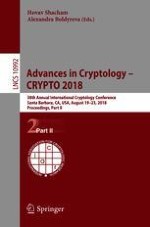2018 | OriginalPaper | Chapter
Promise Zero Knowledge and Its Applications to Round Optimal MPC
Authors : Saikrishna Badrinarayanan, Vipul Goyal, Abhishek Jain, Yael Tauman Kalai, Dakshita Khurana, Amit Sahai
Published in: Advances in Cryptology – CRYPTO 2018
Publisher: Springer International Publishing
Activate our intelligent search to find suitable subject content or patents.
Select sections of text to find matching patents with Artificial Intelligence. powered by
Select sections of text to find additional relevant content using AI-assisted search. powered by
Abstract
-
We construct the first round-optimal (i.e., four round) MPC protocol for general functions based on polynomially hard DDH (or QR or N\(^{th}\)-Residuosity).
-
We further show how to overcome the four-round barrier for MPC by constructing a three-round protocol for “list coin-tossing” – a slight relaxation of coin-tossing that suffices for most conceivable applications – based on polynomially hard DDH (or QR or N\(^{th}\)-Residuosity). This result generalizes to randomized input-less functionalities.
